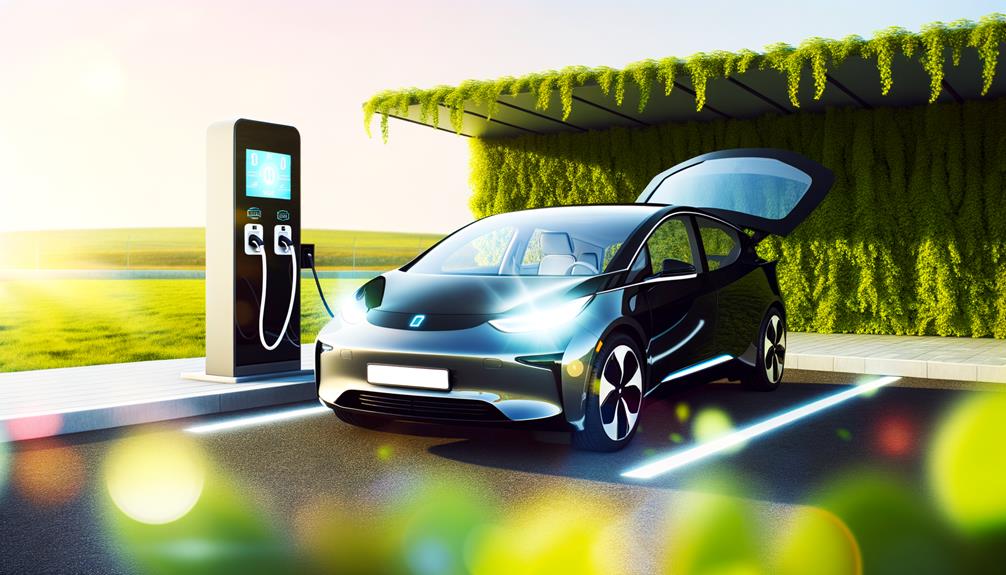You're probably wondering if it's really possible to lease an electric car for free, and the answer is yes, with the right approach. By combining federal tax credits, state incentives, and other strategies, you can drastically reduce or even eliminate your lease payments. Imagine driving a new EV without the financial burden—sounds appealing, doesn't it? But where do you start? Understanding the landscape of EV leasing and how to tap into these benefits is essential. Let's explore the steps you need to take to make this a reality.
Contents
Understanding EV Leasing
When it comes to understanding EV leasing, it's vital to recognize the financial benefits that make this option increasingly popular. EV leasing offers a cost-effective entry into the world of electric vehicles, especially with various incentives designed to make it more affordable. Programs like the Clean Vehicle Assistance Program provide grants of up to $5,000 for eligible households, considerably lowering the barrier to entry.
One of the key advantages of EV leasing is the potential for low monthly payments. For instance, lease deals for models like the 2024 Nissan LEAF can be as affordable as $109 per month in some regions. In some cases, you might even find electric car leases for under $40 per month, depending on the terms and incentives available.
Additionally, leasing an EV often means a lower down payment compared to buying. This can make it easier for you to get behind the wheel of a new electric car without a hefty initial outlay. Furthermore, many lease agreements include warranty coverage, which reduces your financial risk by covering potential repair costs.
Federal tax credits play a key role in making EV leasing attractive. Although these credits, up to $7,500, are typically applied to the lessor, the savings are often passed down to you through reduced monthly payments, making the lease even more affordable.
To sweeten the deal further, some programs, like Octopus Electric Vehicles, offer free home charging when you lease an EV and use their energy service. This not only cuts down on your operational costs but also enhances the overall affordability of electric car leases.
Maximizing Federal Tax Credits
When you're looking to lease an electric car, understanding tax credit eligibility is essential to maximizing your savings. Leasing companies often pass on the federal tax credit of up to $7,500 through lower lease rates or rebates, making your lease more affordable. Combining these federal benefits with state-level incentives, like Colorado's $5,000 state tax credit, can greatly reduce your overall costs.
Tax Credit Eligibility
Releasing the full potential of federal tax credits can greatly lower your electric vehicle lease costs, making it almost feel like a free ride. When leasing an EV, the federal tax credit can be a game-changer. Here's how you can maximize these savings:
- Understand the Leasing Program: The federal tax credit for electric vehicles, often up to $7,500, is claimed by the lessor. Many leasing companies pass these savings onto you by reducing your lease payments or offering rebates.
- Commercial Vehicle Classification: Under the Inflation Reduction Act (IRA), leased EVs classified as commercial vehicles can access the full federal clean vehicle credit. This provides more flexibility and higher potential savings.
- Combine Federal and State Incentives: Pairing federal tax credits with state-specific incentives, like Colorado's $5,000 tax credit, can push your total savings up to $12,500. This greatly reduces your overall leasing costs.
- Consult a Tax Professional: To fully understand and leverage these benefits, consult a tax professional. They can help you navigate the complexities of the lease terms and guarantee you maximize your vehicle credit and other incentives.
Leasing Benefit Strategies
By leveraging federal tax credits effectively, you can transform the economics of leasing an electric vehicle, making it an incredibly cost-effective choice. When you lease an EV, you're potentially eligible for up to $7,500 in federal tax credits. While you don't directly receive this credit, the lessor can pass these savings on to you through lower monthly lease payments or upfront rebates, considerably reducing your leasing costs.
Understanding the tax credit loophole in the Inflation Reduction Act is essential. By leasing EVs classified as commercial vehicles, you can access the full credit benefits, maximizing your savings. Unlike purchasing, income limits don't affect lessees, allowing more people to benefit indirectly from these credits, making leasing an attractive option.
Additionally, some leasing companies might offer further savings through state incentives. For instance, Colorado provides a $5,000 tax credit, enhancing overall affordability and reducing your effective monthly payments even more.
Consulting a tax professional is highly advisable. They can help you navigate lease terms and optimize benefits from these tax credits, ensuring you get the maximum financial advantage. With the right strategy, leasing an EV becomes not just affordable but possibly free.
State and Local Incentives

Maneuvering the myriad of state and local incentives for leasing an electric vehicle (EV) can notably reduce your overall costs, making the dream of driving an EV more accessible than ever. By tapping into these incentives, you can considerably lower your lease payments and enjoy the numerous benefits of clean energy.
- State Tax Credits and Rebates: Many states offer substantial tax credits and rebates for leasing an EV. For instance, California's Clean Vehicle Rebate Program provides up to $4,500 based on your income. Similarly, Colorado offers an additional $5,000 credit for qualifying vehicles, dramatically cutting down your lease costs.
- Local Assistance Programs: Some local programs, like the Clean Vehicle Assistance Program, grant up to $5,000 to low and moderate-income households when they lease an EV. This makes it easier for a broader range of people to access the benefits of electric vehicles.
- Utility Company Programs: Certain utility companies offer programs that provide lower electricity rates for EV charging. This can reduce your energy bill substantially. Some utilities may also offer incentives for installing home EV chargers, further lowering your overall expenses.
- Federal Tax Credits: Although federal tax credits aren't directly for lessees, leasing companies often pass on the savings. These credits can be up to $7,500 based on the vehicle's battery capacity. When leasing companies receive these credits, they typically reflect them in the lease terms, making your monthly payments more affordable.
Choosing the Right EV
When choosing the right EV, think about budget-friendly options like the Chevy Bolt or Hyundai Ioniq 5, both known for their affordability and impressive range. Don't forget to factor in lease incentives and rebates, which can drastically reduce your overall costs. Also, evaluate the range and performance to guarantee the vehicle meets your daily driving needs.
Budget-Friendly EV Options
Choosing the right electric vehicle (EV) for leasing can be a straightforward process with the plethora of budget-friendly options available today. Whether you're looking for an electric car to lease for free or simply aiming to maximize your savings, these strategies can help you find the best deal.
Consider these budget-friendly EV options:
- 2024 Nissan LEAF: With lease deals as low as $109/month in certain regions, the Nissan LEAF is a fantastic budget-friendly option. Take advantage of lease cash offers and additional incentives to make this car even more affordable.
- Clean Vehicle Assistance Program: This program can provide up to $5,000 in grants for low to moderate-income households, greatly offsetting the cost of your EV lease.
- California Clean Fuel Reward: This incentive offers up to $1,500 off the purchase price at participating dealerships, further reducing your leasing costs.
- Federal Tax Credits: Leasing an EV can qualify you for federal tax incentives, potentially up to $7,500, depending on the vehicle. This can greatly lower your overall leasing expenses.
Additionally, considering a used EV lease can be a smart move. Used EVs often come with savings of $3,000 to $7,000+ compared to new models, making them a practical choice for budget-conscious drivers.
Evaluating Range and Performance
While budget-friendly options make leasing an electric vehicle more accessible, it's also important to evaluate the range and performance to guarantee the EV meets your needs. Start by considering the range; modern EVs typically offer between 250 to 400 miles on a single charge. This can greatly impact your daily driving experience, especially if you have a long commute or frequently travel.
Performance metrics are vital too. Look at acceleration and handling; some EVs can go from 0 to 60 mph in under 4 seconds, providing a thrilling, sporty drive. Battery capacity, measured in kilowatt-hours (kWh), directly influences both range and charging speed. While larger batteries offer longer ranges, they can also increase the vehicle's weight and cost.
Fast charging capabilities are a game-changer for long trips. EVs supporting fast charging can reduce charging times to as little as 20-40 minutes at public fast charging stations. And don't forget about energy efficiency, expressed in miles per kWh. This helps you estimate the cost per mile and the overall operating costs.
Lease Incentives and Rebates
Maneuvering the world of lease incentives and rebates can make leasing an electric vehicle (EV) not just affordable, but potentially free. By understanding and utilizing available programs, you can markedly reduce the cost of leasing an EV.
- Clean Vehicle Assistance Program: This program offers grants up to $5,000 for low to moderate-income households to lease or buy an EV. It's a substantial aid that can cover a considerable portion of your lease payments.
- California Clean Fuel Reward: This initiative provides an additional $1,500 reduction at dealerships for eligible EV leases. When combined with other incentives, it greatly lowers your out-of-pocket expenses.
- Federal Tax Credits: Depending on the vehicle's battery size and manufacturer, federal tax credits can reach up to $7,500. These credits directly reduce your monthly lease payments, making it a vital factor in your leasing decision.
- State Rebates: Many states offer rebate programs varying from $2,000 to $4,500 based on income. These rebates further enhance the affordability of leasing an EV.
Don't forget about the EV Charger Tax Credit, which can offset the cost of installing a free home EV charger. By leveraging these lease incentives and rebates, you're well on your way to leasing an electric car for little to no cost.
Free Charging Options

Maneuvering the landscape of free charging options can be incredibly rewarding for electric vehicle (EV) lessees. Programs like Octopus Electric Vehicles' DriveFree offer unlimited free home charging if you sign up for their energy services. This means you can power your vehicle without additional costs, making the shift to an EV even more appealing.
Switching to Octopus Energy and opting for their Intelligent Octopus energy plan can greatly reduce your monthly payment obligations. You'll receive monthly credits on your energy bills specifically for charging expenses. Plus, Octopus Energy provides 100% renewable energy, so you won't have to worry about fossil fuel reliance for your home EV charger. It's a win-win for both your wallet and the environment.
To take full advantage of these benefits, you'll need to install an EV charger at home. While the lease might not cover the installation, the investment can pay off quickly with the savings on fuel costs and free EV charging. If you choose to lease a pre-owned EV model, you could save an additional $3,000 to $7,000+, further offsetting any initial installation costs.
For those on the go, public chargers also offer an array of free charging options. Many shopping centers, workplaces, and public parking areas provide free EV charging stations. By planning your trips and charging stops strategically, you can maximize these opportunities and keep your vehicle charged without dipping into your monthly budget.
Expert Tips for Leasing
Maneuvering the intricacies of leasing an electric car can feel overwhelming, but expert tips can help streamline the process and save you money. If this is your first time considering an EV lease, you'll want to make informed decisions to maximize savings and benefits. Here are some essential expert tips:
- Utilize Free Charging Programs: Look for leasing programs that offer free home charging solutions. Companies like Octopus Energy provide packages that include a home charger, which can greatly cut down your overall EV operating costs.
- Leverage Incentives and Rebates: Federal and state incentives such as the Clean Vehicle Assistance Program and the federal tax credit can tremendously lower your lease payments. These incentives often act as a lease bonus, making the prospect of a free EV lease more attainable.
- Consider Used EVs: Don't overlook the option of leasing a used EV. These often come with lower monthly payments, and when combined with available incentives ranging from $3,000 to $7,500, they can be a better deal than brand-new models.
- Research and Negotiate: Always compare lease offers from multiple dealers to find the best terms. Negotiation is key—don't hesitate to ask for perks like included maintenance or low upfront costs. Using resources like online forums and local EV advocacy groups can keep you informed about current promotions and rebates.
Frequently Asked Questions
Is It Cheaper to Lease an Electric Car?
Yes, it's often cheaper to lease an electric car. You'll save on total cost, maintenance savings, and insurance rates. Plus, the charging infrastructure's expanding, resale value's improving, and the driving experience is superior with a lower environmental impact.
Does the EV Tax Credit Apply to Leases?
Yes, the $7,500 EV tax credit applies to leases. EV leasing benefits include tax savings and lease incentives. Manufacturer rebates and depreciation factors improve credit eligibility and payment structures, making electric vehicle leasing more accessible and affordable.
Why Most Electric Cars Are Leased Not Owned?
You'll find most electric cars are leased due to favorable leasing trends and financial incentives. Leasing offers benefits like lower monthly payments, reduced depreciation rates, and flexibility, aligning with consumer preferences for new technology and minimizing environmental impact.
Is There a Tax Deduction for Leasing an Electric Car?
Yes, there are tax implications when leasing an electric car. You'll benefit from leasing benefits, electric vehicle incentives, and potential long-term savings. Conduct a financial analysis to understand consumer preferences and the environmental impact of your decision.
Conclusion
By strategically leveraging federal tax credits, state and local incentives, and opting for free charging options, you can potentially lease an electric car at no cost. Don't forget to explore grants for low to moderate-income households and consider used EVs for even greater savings. With these expert tips, you'll be well on your way to driving an eco-friendly vehicle without breaking the bank. Happy leasing!
